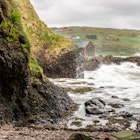
Top free things to do in Belfast from fictional worlds to historic murals

Jul 26, 2022 • 8 min read

After climbing Cave Hill for the epic views stop for a walk in the gardens of Belfast Castle © Juan_Sanchez / Shutterstock
Though pints don’t cost what they used to, Belfast isn’t an expensive city compared to its capital contemporaries in Western Europe.
And with public parklands, admission-free museums, fictional worlds recreated through art and sculptures on the city streets, and an architectural melody borrowing from various traditional European styles, there are plenty of free excursions for budget-conscious travelers to Belfast. Check out our top 10 free things to do there.
Survey the cityscape from Cave Hill
At 368 meters (1207ft), Cave Hill would hold less significance in loftier ranges. But thrusting upwards from the fringes of low-lying Belfast spread across the silty Lagan river basin, it’s the best vantage point in the city; surveying the fragmented urban expanse below and the large estuary where the River Lagan meets the Irish Sea.
- placement: fullWidth
- path: articles/in-content-top
- possible size: [970, 250], [970, 90], [728, 90], [300, 250], [320, 50], [1, 1],
- targeting:
{ "url": "top-free-things-to-do-in-belfast", "destination": "Belfast", "continent": "Europe", "country": "Northern-Ireland", "city": "Belfast" }
The 4.5-mile Cave Hill trail is accessible even to novice hikers and will guide you past the five eponymous caves en route to the jutting peak, called McArts Fort after an ancient promontory defense that once surmounted the hill. Entry to Cave Hill Country Park is free, while Belfast Castle sits in its lower reaches. On spring and summer days, families flock to the manicured gardens dotting the castle perimeter – entry to its four rooms of exhibits is also free.

Enter Narnia at CS Lewis Square
Fans of the Narnia Series will want to set aside an afternoon to visit CS Lewis Square. Indicated by the Luminaries and Legends mural, depicting famous faces from east Belfast on a gable wall, the square and pine-dotted footpath showcase sculptures based on the characters of Lewis’s fantastical imagination. From a thorny Aslan to a metallic White Witch, the adored and despised of the Narnia pantheon take center stage.
Keen walkers can then join the Connswater Community Greenway, a 5.5-mile trail connecting the parklands of east Belfast, funneling southward towards the Castlereagh Hills. For pre-walk refreshments, there’s an artsy cafe called JACK – which also has east Belfast history and tour books for sale – on the corner of the square. Then you’re free to venture into a series of wildlife corridors and green spaces that belie your location in Northern Ireland’s most populous city.
Go for a “dander” along the Lagan Towpath
Connecting south Belfast to Lisburn City, the Lagan Towpath charts an 11-mile-course alongside the centuries-old River Lagan canal system. It bisects humpy meadows, parklands home to ancient oaks and acorn-hoarding squirrels, and marshes alive with fungi, flora and cacophonous birdsong. If you’ve patience and a keen eye, you might also spot otters and seals taking refuge in the gentle waters.
Entry to the Towpath and its surrounding parks won’t cost you a penny, and if you want to expedite your journey, the towpath is also accessible to cyclists. Good footwear or solid tires are recommended, especially after heavy rainfall.
Chart the history of Westeros via the Glass of Thrones
Game of Thrones has an intrinsic connection to Northern Ireland, the home of rural filming locations and manmade sets used in the HBO show. Travelers to Belfast can get a flavor of Westeros without dipping into their trip budget through the Glass of Thrones trail.
- placement: fullWidth
- path: articles/in-content-middle
- possible size: [970, 250], [970, 90], [728, 90], [300, 250], [320, 50], [1, 1],
- targeting:
{ "url": "top-free-things-to-do-in-belfast", "destination": "Belfast", "continent": "Europe", "country": "Northern-Ireland", "city": "Belfast" }
Head for the 1.5-mile route along the waterfront, which connects six impressionist stained-glass artworks reimagining famous scenes and characters from Westerosi lore. The Battle of the Bastards, Lady Melisandre, Daenerys riding fire-breathing Drogon, the Night King, the Iron Throne, and the Lannister reign are all included. Guided tours, led by extras from the TV series, are available from £8 per person, but you can scrimp by taking on the journey yourself.
Punctuate the short tour with a visit to The Dark Horse, a cafe in the charming Cathedral Quarter. Part of the exclusive Journey of Doors project, you’ll find an artistic rendering of Baelor’s Sept engraved into one of its interior doors, made from varnished beech wood sourced at the Dark Hedges.
Meet a Mummy at Northern Ireland’s top science and history museum
The Ulster Museum in Botanic Gardens is instantly recognizable: a neoclassical-brutalist building encircled by the leafy boughs of a tree-topped lawn. But while its facade may draw your gaze, you’ll need no better invitation than its free admission price and impressive art, science and history collections to venture inside.
History exhibits trace Northern Ireland's trajectory from the possibly uninhabited Paleolithic era through the war-torn 20th-century Troubles, with excavated curios, artistic renderings, original photographs, and recovered documents. The natural sciences section focuses on animal and plant life through the ages, displaying the fossilized treasures of archaeological digs, the only dinosaur bones discovered in Northern Ireland, and an assortment of taxidermy mounts. While the art collections focus on painting, sculpting, metalwork, textiles and contemporary art. You’ll also find Takabuti in the museum, the mummified remains of an Egyptian woman from the Nubian Dynasty (746 - 653 BCE).

Meet Samson and Goliath at the Titanic Quarter
As a low-lying city, the yellow Harland and Wolff cranes, dubbed Samson and Goliath, commandeer most views of the Belfast skyline. To appreciate their size and scale – at 348ft and 315ft, respectively, both are taller than the Statue of Liberty – head down to Belfast’s coastal Titanic Quarter, named after the sea liner which met its icy fate in 1912.
The Titanic Belfast museum rises from the nearby harbor, although general admission is £21.50 per head. If you’re counting the pennies, the Maritime Mile walk is a free alternative, connecting historical implements used during Belfast’s industrial past and the Salmon of Knowledge artwork on the fringes of the city center. You’ll get cracking views of Belfast Lough from here too, while early morning larks will be rewarded with watercolor sunrises.
Don’t miss free exhibits at the Modern Arts Center
One of several major construction projects completed in 2012, the Modern Arts Center, or “MAC” for short, is a hub of culture, theater and creativity, holding a place of special significance in Belfast’s arts scene. Live shows in its 120- and 350-seater auditoriums will cost money, but as many of the shows are independent and experimental, you’ll often get better deals than in the more prominent playhouses.
The art galleries, however, are typically free of charge (with donations welcomed). Guest exhibitions showcase immersive contemporary art by local creatives and world-renowned virtuosos, while child-friendly projects, like Imagination Station (2022), allow kids to engage with their inner artists via free-to-use supplies. The MAC rubs shoulders with St Anne’s Square, a good spot for a stroll when diners descend on the adjacent restaurants come nightfall, filling the air with a vibrant buzz.
- placement: native
- path: articles/in-content-native
- possible size: [f, l],
- targeting:
{ "url": "top-free-things-to-do-in-belfast", "destination": "Belfast", "continent": "Europe", "country": "Northern-Ireland", "city": "Belfast" }

Immerse yourself in Belfast’s historic murals
It is a stark juxtaposition that the color-infused murals slapped across Belfast’s walls often depict the darkest periods of its past. The near-2000 murals evoke scenes and stories from Troubles-era Belfast, while more modern works focus on peace, prosperity and cultural icons.
There are murals celebrating Belfast’s Gaelic roots, murals depicting political prisoners and Republican hunger strikers, murals drawing parallels between the Israeli occupation of Palestine and the British occupation of Ireland, murals commemorating paramilitary groups and the pro-union Orange Order, and murals symbolizing an end to armed struggle. It’s a lot to take in, and like as not for newcomers, difficult to grasp.
The Peace Walls, dividing Catholic and Protestant communities across Belfast, have the greatest congregation of political artworks, all of which you can view for free. Paid guided tours, however, are recommended as the safest and most educational method of viewing Belfast’s complicated street art.
Dark tourism at the Northern Ireland War Memorial Museum
A strategic hub of manufacturing and industry, and one of the UK’s most densely populated urban areas during the Second World War, Belfast was on the receiving end of four Luftwaffe bombing raids – known collectively as the Belfast Blitz. This is one of the focal points of the free-to-enter Northern Ireland War Memorial Museum, which sits in Belfast’s otherwise jovial Cathedral Quarter. Other exhibits explore the role of the US Forces, women in wartime Belfast, and the Ulster Home Guard.
Through 3D artworks, wood-carved tableaus, period trinkets and preserved manuscripts, guests are transported to one of the harshest eras of Belfast’s turbulent history. It helped sow the seeds of the city’s subsequent decline and irrevocably shaped the lives of its inhabitants.
Go on a self-guided architecture tour of Belfast city center
Marrying Georgian, Edwardian and Victorian styles with neoclassical structures and modern architectural designs, the Belfast cityscape is a treat for aesthetes. Belfast succumbed to Second World War air raids, and the subsequent destruction of the Troubles, during which many original buildings were damaged or razed – the Europa Hotel, famed for its colonnaded entrance, is the most bombed hotel on the continent, surviving 33 individual explosions from the 1970s through the 1990s.
Thanks to restoration projects, however, many original facades have been recreated or preserved, meaning businesses in the city center often sit within the capacious halls and former antechambers of old-world buildings. Red-brick arches, jaunty turrets and narrow arcades set the scene on the main high street, Donegall Place. Cut through the central city to alight at the gates of Belfast City Hall, a magnificent Baroque Revival building topped by mint-green domes and filled with marbled interiors (free public tours of the interior are available).
Other photo-worthy structures include the Gothic, clay-colored Queen’s University Lanyon Building in south Belfast; the city center Opera House, formerly coined the “Palace of Varieties”, fusing Belfast’s endemic red-brick style with Oriental trimmings; the neomodern Titanic Belfast, looking like the gleaming convergence of several ships’ prows; and the Victorian-era Albert Clock, Belfast’s answer to the Leaning Tower of Pisa.
- placement: fullWidth
- path: articles/bottom
- possible size: [970, 250], [970, 90], [728, 90], [300, 250], [320, 50], [1, 1],
- targeting:
{ "url": "top-free-things-to-do-in-belfast", "destination": "Belfast", "continent": "Europe", "country": "Northern-Ireland", "city": "Belfast" }
Explore related stories

Activities
Ireland itineraries: 5 routes that show off the best of the islandSep 6, 2024 • 12 min read



 ActivitiesYou’ve probably never been to Southwest Scotland: here’s why you should go
ActivitiesYou’ve probably never been to Southwest Scotland: here’s why you should goDec 5, 2023 • 7 min read
 Budget Travel10 budget ways to see Belfast: money-saving tips for the capital of Northern Ireland
Budget Travel10 budget ways to see Belfast: money-saving tips for the capital of Northern IrelandAug 4, 2022 • 8 min read

 BeachesThe best beaches near Belfast, from shingle coves to North Atlantic surf
BeachesThe best beaches near Belfast, from shingle coves to North Atlantic surfJul 19, 2022 • 5 min read
 Activities15 best things to do in Belfast: everything you need to try in Northern Ireland’s capital
Activities15 best things to do in Belfast: everything you need to try in Northern Ireland’s capitalApr 1, 2022 • 14 min read

